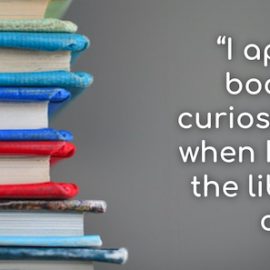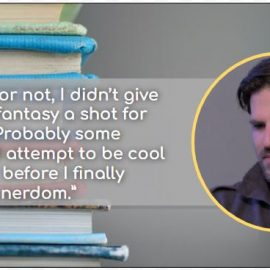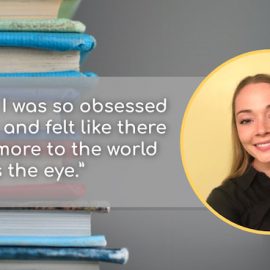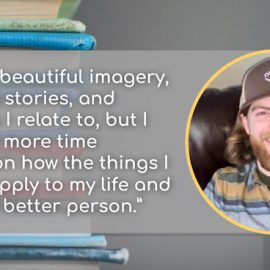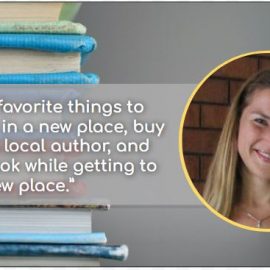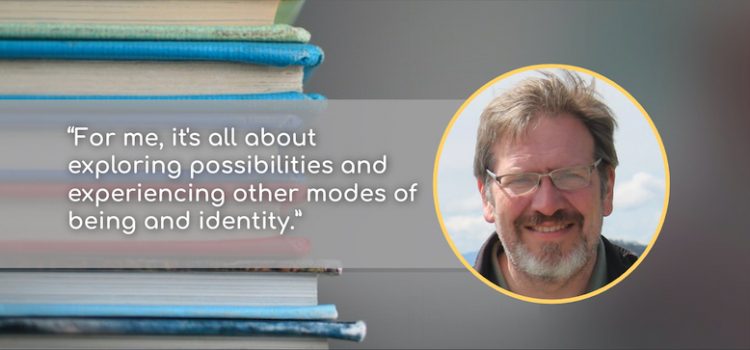
What’s the most beautiful sentence ever written? What author shows you something new every time you reread his books? What book has one interesting fact after another?
Jared could tell you. Based in Atlanta, he’s a book guide writer at Shortform. We interviewed him recently to learn a bit about his relationship with books.
Our Interview With Jared
Jared is a self-declared science fiction and fantasy nerd. Here’s what he had to say about some of his favorite books in that category as well as a few others he’s read over the years.
What’s your favorite book and why?
The book that’s brought me the most joy in life is The Hitchhiker’s Guide to the Galaxy by Douglas Adams. I first encountered it via the radio program and the original BBC television series, which was broadcast on NPR and PBS when I was 12. When I realized there were books, I snatched them up and read them over and over. Adams pretty much shaped my personal outlook on life, the universe, and everything.
What are you reading these days?
The last not-for-Shortform book I finished was The Galaxy, and the Ground Within by Becky Chambers. It’s the final installment in her Wayfarers series, which is full of aliens, spaceships, other worlds, etc., but focuses on identity, relationships, and communities rather than the usual space-opera conflict.
Then, for something completely different, I’m currently reading The Conquering Sword of Conan, the last of three volumes collecting Robert E. Howard’s original Conan the Barbarian stories.
Next up, I might dive into non-genre fiction with Anywhere but Here by Mona Simpson.
What’s your favorite genre? Why does it intrigue you?
My science fiction and fantasy (SFF) nerdery is strong. For me, it’s all about exploring possibilities and experiencing other modes of being and identity. To be sure, all fiction does that, but SFF takes it to a whole other level. For example, Ursula Le Guin was talking about gender fluidity decades before mainstream society caught up. Star Trek birthed a whole generation of engineers who saw all those cool gadgets and said, “I can make that”—which is why we had flip phones just like Captain Kirk’s for a while. And, the way we conceive of the Internet and cyberspace was born from a bunch of pimply-faced computer geeks who wished they were characters in a William Gibson novel—speaking as one myself.
Are there any book genres or tropes that you dislike or refuse to read?
A few tropes come to mind that I’d like to see retired. For one, the whole “college professor has a midlife crisis and an affair with one of his students” thing, though I haven’t bumped into that one since The Art of Fielding by Chad Harbach, which is an otherwise excellent book.
Another is the trend in some romance novels to glamorize toxic relationships. I had to quit reading A Discovery of Witches halfway through because it made me so angry.
In short fiction, there have been more and more stories written in a second-person voice. For example, “You walk up the stairs and fumble for the light switch. A voice whispers into your ear.” It’s hypocritical for me to say this because I’ve written in that mode myself once or twice, but I see it so often now that I wish everyone would just stop.
What’s your favorite way to read a book?
Sitting on a shady porch, in a swing or a rocking chair, on a spring or fall afternoon. The medium doesn’t matter so much; print or e-book is fine. For e-books, my preferred device is an old Nook Glowlight, though I know it’s the Betamax of e-readers.
Was there a specific book that sparked your love of reading?
When I was in elementary school, I was assigned to read Madeleine L’Engle’s A Wrinkle in Time. It wasn’t the first book I read, but it was the first time I became so immersed in a story that I stopped being aware that I was reading at all. I just watched the book unfold in my mind. After that, I was pretty much hooked.
What’s an interesting fact that you learned from a book recently?
I recently read Walter Isaacson’s biography of Steve Jobs for Shortform, and one interesting fact is … all of it. But, here’s one in particular. On June 29, 1975, Steve Wozniak took his prototype circuit board for what would become the Apple I, hooked it up to a monitor, and became the first person in history to type on a keyboard and see text appear on a home computer screen.
What’s your favorite quote from a book or an author?
“It was a day as perfect as the flame of a candle” (Ray Bradbury, Dandelion Wine). In my opinion, that may be the most beautiful sentence ever written.
Are there any lesser-known books that you’ve read that you want others to know exist?
The Book of the New Sun by Gene Wolfe is one of the greatest fantasies ever written, yet I hesitate to recommend it to people because I’m afraid they won’t “get it.” It’s a coming-of-age story about a torturer’s apprentice who’s thrown out of his guild for showing mercy to a victim. It has all the tropes of a standard fantasy quest, but Wolfe doesn’t use them in any way you’d expect. Wolfe is one of those writers who shows you something new every time you reread him. This series in particular is almost as if James Joyce had written The Lord of the Rings.
What are your favorite books in the Shortform library and why?
Carl Sagan’s Cosmos was a foundational book for my understanding and appreciation of science—and part of the reason I got a physics degree as an undergrad. I read Brené Brown’s Daring Greatly at a time in my life when I really needed it. And, I have to recommend Behind the Beautiful Forevers by Katherine Boo. It’s an important window into the harsh realities faced by those who don’t live in the cocoon of Western consumer-driven culture.
Jared’s Recommended Reading List
- The Hitchhiker’s Guide to the Galaxy by Douglas Adams
- The Book of the New Sun by Gene Wolfe
- Cosmos by Carl Sagan
- Daring Greatly by Brené Brown
- Behind the Beautiful Forevers by Katherine Boo
About the Series
At Shortform, we want to give our employees names and faces so you can get to know the people who make the magic happen. That’s why we’re doing the Shortform Reads series, where we interview our employees and share their thoughts and opinions. You can check out more employee interviews here.

